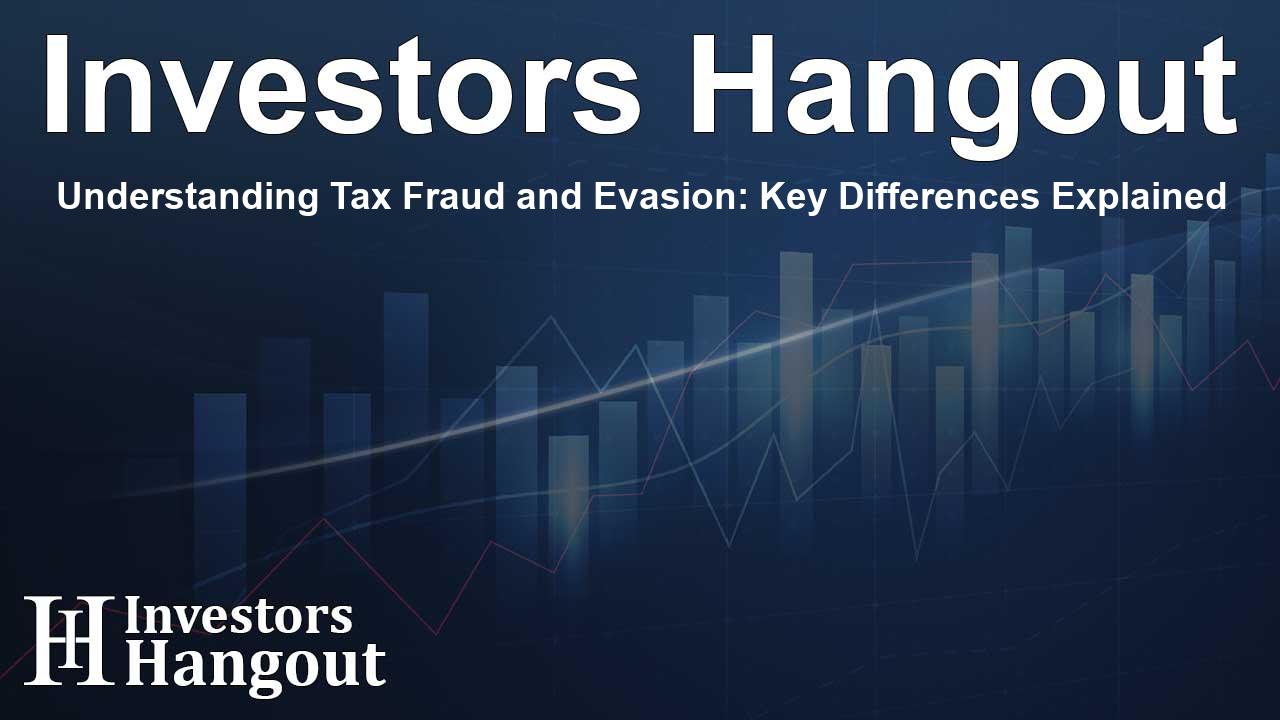Understanding Tax Fraud and Evasion: Key Differences Explained

Understanding Tax Fraud and Evasion: Key Differences
When discussing taxes, one can often hear terms like tax fraud and tax evasion used interchangeably. However, these terms represent two distinct concepts in the realm of tax law. It’s critical for individuals to recognize the differences to ensure compliance with federal regulations and avoid severe consequences.
What Is Tax Fraud?
Tax fraud is characterized by the intentional misrepresentation or concealment of information to decrease one’s tax liability. In this context, fraud is defined by two vital components: there must be a tax owed, and the taxpayer must have a clear intent to deceive the government. Unlike mistakes that might arise during the filing process, tax fraud is a deliberate act aimed at avoiding payments legally due.
Common tactics that reflect fraudulent intent include underreporting income, improperly inflating deductions, or hiding assets. Each of these actions is driven by the intention to reduce the amount owed to tax authorities.
Tax Fraud Penalties
The penalties for tax fraud can be severe, comprising both civil and criminal repercussions. According to tax code provisions, those found guilty of tax fraud may face civil fraud penalties that could reach 75% of the underpaid taxes. Moreover, serious cases may result in criminal charges which might carry penalties such as:
- Up to 5 years in federal prison
- Fines reaching $100,000 for individuals
- Fines up to $500,000 for corporate entities
- Costs incurred for prosecution, including investigator and attorney fees
What Is Tax Evasion?
Although tax evasion is often conflated with tax fraud, it concerns a different set of actions. Specifically, tax evasion occurs when someone willfully avoids paying their tax liability. This could be through underpayment or other deceptive tactics. It's essential to distinguish that while utilizing lawful deductions is allowed, deceitful conduct represents a criminal act.
Intentional failure to file a tax return doesn’t by itself signify tax evasion. There needs to be an affirmative action proving the taxpayer's intention to violate the law.
Tax Evasion Examples and Penalties
Tax evasion can manifest in various ways, such as not reporting cash income, transferring funds to offshore accounts, or failing to disclose cryptocurrency assets. Each of these actions is a calculated decision made to mislead tax authorities.
Under tax legislation, tax evasion is categorized as a felony, resulting in significant consequences for those convicted. The penalties for tax evasion can include:
- Up to 5 years in federal prison
- A fine of $100,000 for individuals
- A fine of $500,000 for corporations
- Liability for prosecution expenses, which might include costs for federal investigator actions
In addition to these penalties, sentences are assessed based on various factors such as the amount of tax evaded, the individual's involvement level, and any previous criminal record.
Legal Support for Tax Issues
If you find yourself accused of tax fraud or tax evasion, it is crucial to seek assistance from a qualified attorney. A professional, like those at the McConnell Law Firm, can provide nuanced guidance tailored to the specifics of your case. Legal representation can make a significant difference whether you aim to defend against accusations or understand your rights in tax matters.
Request a Consultation
Tax matters can be complex and navigating them requires expertise. If you or someone you know needs help regarding tax fraud or evasion, consider reaching out to the McConnell Law Firm for professional legal assistance. Skilled attorneys are ready to help you understand your situation and develop a solid defense strategy.
Frequently Asked Questions
What is the main difference between tax fraud and tax evasion?
Tax fraud involves intentionally misleading tax authorities, while tax evasion refers to deliberately underpaying taxes owed.
What are the penalties for tax fraud?
Penalties for tax fraud can include civil fines and up to 5 years in prison, along with significant monetary fines.
Is tax evasion a felony?
Yes, tax evasion is considered a felony and can result in serious legal consequences.
Can I be penalized for accidentally underreporting my income?
While penalties apply for intentional misrepresentation, accidental errors may result in less severe consequences, depending on the situation.
How can I get legal help if I'm facing tax charges?
If charged with tax fraud or evasion, contacting a knowledgeable attorney who specializes in tax law is advisable for guidance and representation.
About The Author
Contact Dominic Sanders privately here. Or send an email with ATTN: Dominic Sanders as the subject to contact@investorshangout.com.
About Investors Hangout
Investors Hangout is a leading online stock forum for financial discussion and learning, offering a wide range of free tools and resources. It draws in traders of all levels, who exchange market knowledge, investigate trading tactics, and keep an eye on industry developments in real time. Featuring financial articles, stock message boards, quotes, charts, company profiles, and live news updates. Through cooperative learning and a wealth of informational resources, it helps users from novices creating their first portfolios to experts honing their techniques. Join Investors Hangout today: https://investorshangout.com/
The content of this article is based on factual, publicly available information and does not represent legal, financial, or investment advice. Investors Hangout does not offer financial advice, and the author is not a licensed financial advisor. Consult a qualified advisor before making any financial or investment decisions based on this article. This article should not be considered advice to purchase, sell, or hold any securities or other investments. If any of the material provided here is inaccurate, please contact us for corrections.
